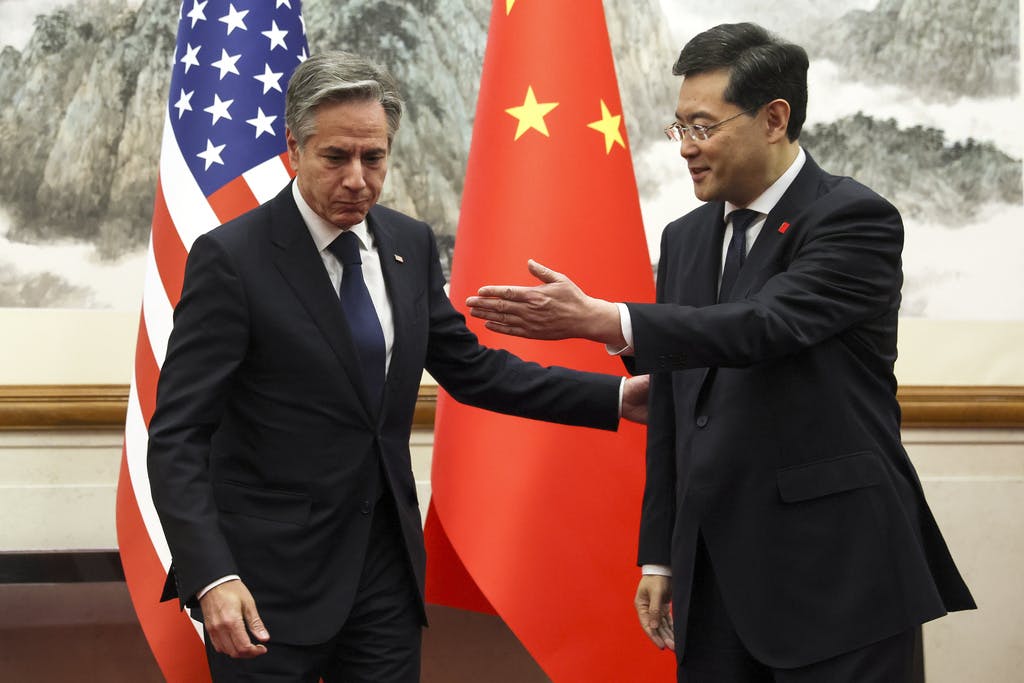Disappearance of Rising Communist Star Has Beijing Watchers Puzzled
Qin Gang, who was named foreign minister in December 2022, was a member of an exclusive circle surrounding the party’s strongman. One idea is that his firing could be a signal from party elders that the chairman must loosen his tight grip on power.

Like Kremlinologists, many China-watchers read the tea leaves in attempts to gain glimpses into the backroom machinations of Beijing’s Communist Party. Such subtlety is in abundance in the case of the foreign minister, Qin Gang, who vanished from view shortly after a powwow with Secretary Blinken and after seeming to have struck up a sort of friendship with the American.
Rising up the Communist political pole faster than anyone in recent memory, the 57-year-old Mr. Qin was named foreign minister in December 2022. He was a member of an exclusive and small inner circle of relatively young men in their 40s and 50s surrounding the party’s strongman, Chairman Xi.
In June, Mr. Qin abruptly disappeared from public view, raising eyebrows in Asia and beyond. Press speculation on the reasons for the disappearance included that he had an extramarital affair with a prominent television anchorwoman or that he had committed a possible affront to Mr. Xi. Conversely, some said his firing could be a signal from party elders that the chairman must loosen his tight grip on power.
Either way, after the rubber-stamp National People’s Congress announced Mr. Qin’s removal on Tuesday, a veteran diplomat and former foreign minister, 69-year-old Wang Yi, was named as replacement. A ministry spokesman said he was unable to answer questions on Mr. Qin’s fate.
Prior to being named foreign minister, Mr. Qin served as China’s ambassador at Washington, where he made little to no headway in reducing tensions between the two countries. Nevertheless, one crucial element of diplomacy is the ability to cultivate good personal ties, and the most important relationship struck by Mr. Qin in his role as ambassador was with the American secretary of state.
“Called Secretary Blinken to say goodbye,” Mr. Qin tweeted as he was leaving Washington during the New Year holiday. “I appreciate several candid, in-depth and constructive meetings with him during my tenure.”
That posting, on the foreign office’s Twitter account, has been purged, as have most of Mr. Qin’s past tweets, save for five postings from January 2 in which he promoted a “win-win cooperation between the two countries.” A sixth posting, from January 4, links to a Washington Post op-ed Mr. Qin wrote, titled, “The planet’s future depends on a stable China-U.S. relationship.”
Back at Beijing Mr. Qin’s arguably most important meeting as foreign minister was in June, when Mr. Blinken came calling. The two men met for five and a half hours and shared a dinner. Afterward, both described their sit-down as “candid and constructive.” A few days later, following a Beijing meeting with officials from Sri Lanka, Russia, and Vietnam, Mr. Qin disappeared from public view.
As President Biden maintained his charm offensive, and while Secretary Yellen and the president’s climate tsar, John Kerry, visited Beijing, Mr. Qin was nowhere in sight. Nor did he share a conversation with the 100-year-old former secretary of state, Henry Kissinger, who came to warn of global dangers from possible China-U.S. hostilities.
Mr. Qin was also removed from the team preparing for a much-anticipated likely meeting between Messrs. Xi and Biden at San Francisco, where America hosts the Asian Pacific Economic Cooperation group summit in November.
Mr. Qin’s absence from public view was at first explained away as health-related, which started the rumor mill spinning. Several Asian outlets and the London Times reported that the real reason was an extramarital affair with a 40-year-old Hong Kong-based anchorwoman, Fu Xiaotian, whose twitter account was last updated on June 26, when Mr. Qin disappeared.
An affair is unlikely to trigger a firing, as it is far from uncommon for reports to emerge that high Beijing officials have had extramarital liaisons. Also unlikely is speculation that Ms. Fu was an American intelligence asset: Hong Kong’s pro-Beijing Phoenix television is very prominent. It would be nearly impossible for its top anchor to escape scrutiny of Chinese counterintelligence agents.
The move to push out Mr. Qin may be aimed at his patron, Mr. Xi. As Mdhav Das Nalapat of the Manipal Academy writes, the foreign ministry shuffle could have been designed as a signal to Mr. Xi — as in “kill the chicken to scare the farmer” — to steer the chairman away from his increasingly one-man, Mao-like rule.
As Communist China builds a new listening post in Cuba, sends a spy balloon across America, and buys farms near major American military installations, our understanding of power plays inside Beijing’s Communist Party is limited. Open societies are by definition much easier to scrutinize than secretive elites rulers, as in China.
The intelligence gap should be a sign for Washington to be wary of diplomacy as usual with Beijing: It should shrug off Mr. Qin’s disappearance and, instead, react to what the Communist behemoth does, rather than which of its officials does it.

